Have you heard of Namibia?
(Orlando Sentinel) On Oct. 18, I departed Orlando for Windhoek, Namibia, in southern Africa, as a U.S. delegate of a government of Namibia-sponsored trade mission. I traveled with Stephen Snively, honorary consul to Namibia for the state of Florida, and met up with 19 other delegates from the United States and Canada. Namibia’s ambassador to the United States, Martin Andjaba, led the delegation.
Our central goal was and is to explore ways to promote public- and private-sector development in Namibia, and strengthen relations between our countries. It had been 12 years since I last visited Namibia, and I was pleasantly surprised to see the country transformed from a former apartheid state into a burgeoning democracy.
Namibia is absolutely beautiful. It is a prettier version of Palm Springs, Calif. Namibia is the second-most sparsely populated country in the world behind Mongolia. It is about five times the size of Florida with a population of 2.3 million, about the same as the Orlando metro area.
Namibians are fiercely independent and very hospitable. This is amazing, given that Namibians were brutally colonized by the German Empire between 1884 and 1915. From 1904 to 1907, long before the Nazi takeover, Germany committed several unspeakable acts of genocide against black Namibians.
South Africa acquired control of the colony in 1915 after defeating German forces in World War I. In 1919, the League of Nations mandated German “South-West Africa” to South Africa to administer. South Africa proceeded to institute a wicked form of apartheid rule over South-West Africa until Namibian independence in 1990. Amazingly, Namibia developed a sustainable democracy and program to combat historic inequality in one year.
While problems persist, today, 23 years later, Namibia is a thriving democracy with a free-market-driven economy and healthy appreciation for the rule of law. It boasts some of the largest game reserves and highest sand dunes in the world. It has breathtaking valleys, roaring rivers and spectacular and abundant wildlife and is an ideal place for eco-tourism, hunting and foreign investment.
Namibia is mineral rich and has a healthy supply of copper, diamonds, gold, granite, lead, tungsten, uranium and zinc. However, Namibians are the country’s greatest resource — they are patriotic, resilient and wise.
Although we disagree on many issues, Steve and I admire the graceful, patient and prudent way in which Namibians, particularly black Namibians, have managed extremely complex racial, sociopolitical and economic issues. Ninety percent of Namibians are Christian. While black Namibians of different ethnic backgrounds dominate the political arena and comprise 94 percent of the population including coloreds (mixed race), foreign corporations command the lucrative mining sector, and white Namibians own the bulk of land and businesses, meaning they control the economy. Consequently, black Namibians, particularly the millennials (born between 1980 and 2000), are becoming increasingly concerned about racialized economic disparities in what can only be described as a rigid economic caste system.
Young Namibians want their own bowl of Mopane worms (a popular food) now and do not fully embrace incrementalism as a viable empowerment strategy to combat nearly two centuries of brutal colonialism and apartheid. Notwithstanding, what Steve and I greatly admire about Namibians is their authentic belief that the rule of law is the best vehicle for resolving the country’s complex societal issues such as land redistribution.
Africa captures the heart and imagination. Steve and I come from very different worlds but have a resounding affection for Namibia. Steve is white, and I am black. He is a baby boomer, and I represent Generation X. Steve is from the Midwest, and I am from the West Coast. He was raised on a farm, and I was raised in the city. Steve is a Republican, and I am an independent. He is a domestic lawyer, and I am an international lawyer. I am a trained scholar, and Steve is not. Notwithstanding, we have more important things in common: We are both Christians with a sincere belief in international public service and an abiding connection to Namibia. Our friendship is born out of our mutual connectedness to God, rule by law and country — Namibia, that is.

